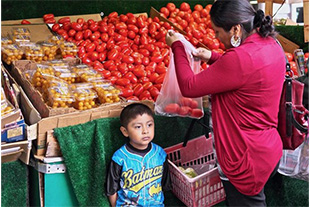Fair Food Futures UK
One in five households with children in the UK cannot afford regular access to food. We call this ‘food insecurity’ and it can have a negative effect on physical and mental health. Many organisations and groups across the UK offer support to people experiencing food insecurity. Some of them provide emergency food packages or cheaper groceries. As well as food, others may also help people to claim benefits or to pay their utility bills. We call these organisations community food assets. Only about half of those who experience food insecurity use a community food asset.

We are a team passionate about easy access to nutritious food for all. Our team consists of researchers from University of York, University College London (UCL), Bradford Institute for Health Research, staff from Bradford and Tower Hamlets (London), local authorities and people with lived experience of food insecurity. Local and National governments have asked us to find out what help different community food assets offer and what approaches they use.
We also want to find out how community food assets can help to reduce the need for emergency food. In doing so we focus on two areas: Bradford and Tower Hamlets, London. (Image by SpencerWing from Pixbay.com).
This is what we are going to do
We will start from mapping what help with food is available in Bradford and Tower Hamlets. We will launch an online survey and then we will conduct workshops and interviews with people working or volunteering in community food assets, people who use them and other stakeholders (eg people working in local authorities and in the food industry). Are you involved in one of these organisations? Please help with mapping help with food, fill in our survey.
Once we have a better understanding of the types and features of different food assets, we will spend about a year volunteering in five of these organisations, to understand how they work on a daily basis.

During the year, researchers will approach some families they meet and, with their consent, they will invite them to be part of “go along interviews” (three in 12 months) to find out what role community food assets play in families’ lives. This is a conversation on the go, an interview that researchers carry out while families go on with their normal activities.
The researchers will also interview families who cannot afford food but do not use community food assets, to understand why they do not use them and how they manage to meet their needs. We will also invite families to share photos and videos of things that are important to them about food. (Image: By Susan Jane Golding (CC BY 2.0) on flickr.com).
How will we share our findings?
We will provide regular updates on findings (with recommendations) to local and national government, voluntary organisations, communities, and researchers at both sites. We will write academic papers and will give talks at conferences and public events. With their permission, the photos/videos that families share with us will become a travelling public exposition. The findings will help local and national governments to invest in resources that are most accessible and most beneficial for communities. We will engage with key stakeholders and the wider society to promote change towards fairer and more secure access to food for families and communities.
This study is linked with “Fix our food” and Act Early-Early Life Changes to Improve Life for Children.
